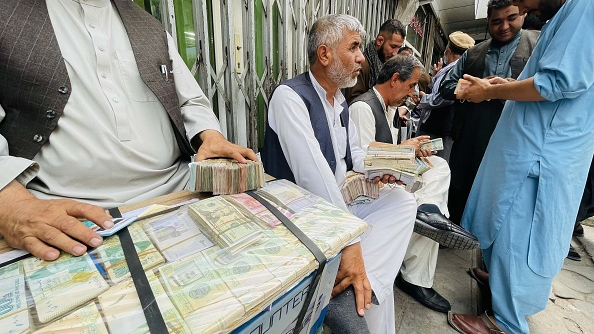
Afghan currency exchange dealers have been hit hard following the fall in value of the Afghani currency, leading to a rise in food prices in Kabul, Afghanistan, July 16, 2021. /Getty
Afghan currency exchange dealers have been hit hard following the fall in value of the Afghani currency, leading to a rise in food prices in Kabul, Afghanistan, July 16, 2021. /Getty
Editor's note: Keith Lamb is a University of Oxford graduate with a Master of Science in Contemporary Chinese Studies. His primary research interests are China's international relations and "socialism with Chinese characteristics." The article reflects the author's opinions and not necessarily the views of CGTN.
Compared to "blue-eyed" Ukraine, Afghanistan seems less likely to be a "worthy victim." As a case in point, you couldn't find Taliban or Al-Qaeda merchandise for sale on Amazon but you can buy the Ukrainian army's neo-Nazi Azov Battalion's merchandise sporting their logo which artistically combines the SS bolts with a swastika.
This contradiction alone should be enough to jolt the same virtue signaling bovine masses, who righteously jeered on the invasion of Afghanistan to question more. However, most will happily follow the herd repeating the "party line," as they did for Afghanistan, that the West is protecting human rights and freedom while remaining blissfully ignorant to the interweaving geopolitical complexities purposely hidden from public consciousness.
For Afghans, with their different customs and physical appearance, except for the rallying call to women's rights and the protection of children, there were few "worthy victims." This was necessary considering it was the West who invaded. Too many "worthy victims" become a liability, for selling a war, when one is carpet-bombing a country or causing a refugee crisis in Afghanistan.
Some people, vis-a-vis Iraq, see Afghanistan as the "good war" which had good intentions although being a strategic mistake. However, from the view of the military-industrial complex 20 years of war profiteering meant the quagmire of Afghanistan was a strategic stroke of "evil-genius" with no good intention.
For Ukraine, it is widely accepted that it is unwinnable as NATO escalation could easily lead to "nuclear Armageddon." At the same time, it would be difficult for Ukraine to defeat Russia. What NATO can do though is arm Ukraine which could lead to a protracted war.
Noting this impasse there is a contradiction between the jingoistic human rights discourse and realpolitik. How would human rights look in Ukraine if peace isn't established? Looking at history, Afghanistan provides a historical lesson.
A recent report by the United Nations High Commissioner for Human Rights entitled "Situation of human rights in Afghanistan, and technical assistance achievements in the field of human rights" shows that after 20 years even the human rights of Afghanistan's "worthy victims" – like women and children – remain in a dire situation.
The report, covering the period from January to November 2021, found that women and children made up nearly half of the 8,300 civilian casualties. Many of those killed and maimed came from leftover explosives; suicide bombers, and crossfire from the Taliban and U.S.-sponsored Afghan government forces.

A father bids farewell to his wife and son at the Kyiv train station, Kyiv, Ukraine, March 1, 2022. /Getty
A father bids farewell to his wife and son at the Kyiv train station, Kyiv, Ukraine, March 1, 2022. /Getty
Despite these sizable figures the horrors presented in the report never made the corporate media. One could argue that this boils down to race where brown eyes are less worthy than blue eyes. However, war profiteering, along with its strategic aims, is color blind. If Ukraine was populated by a melanin-rich populace with a different culture then the multicultural card would have been played by the corporate media who advertise war and who, like all good advertisers, sell to our emotions, not our logic.
While the Afghan citizens were never "worthy victims," the fact that they are now yesterday's profits means even the human rights atrocities against the former worthy victims are now inconsequential to the media. Even the eight reported cases of rape against children consisting of one girl and seven boys, detailed in the UN report, received no attention.
Seven of the eight rapes were carried out by the U.S.-supported Afghan National Army and Afghan National Police. However, the U.S. army where told to "look the other way." This type of unprincipled attitude no doubt explains the acceptance of Ukraine's neo-Nazis today.
After 20 years of war, Afghanistan has been destroyed and, as the report shows, poverty remains the main barrier for ensuring the human rights of children and women which had always been lacking even at the height of U.S. control. Thus, the urgent question is, if the aim of invading Afghanistan was to protect human rights and freedom, was the trillions spent over 20 years good use of Western taxpayer's money? Without a shadow of a doubt, this was among one of the greatest human rights disasters of the 21st century.
Today, as a European living close to Ukraine; as someone who believes in development, not war, and as a human who sees our fellow humanity in all eye colors I fear that without learning the lessons of Afghanistan and seeking peace, what awaits in Ukraine is yet another 20-year long human rights disaster.
Under this scenario, an "optimistic" outlook would be that only Ukraine is destroyed. Under a more pessimistic outlook, it could pull all of Europe into hostilities and then, at worst, consume the world which risks the annihilation of us all.
A "worthy victim" essentially gives us permission to understand and empathize with others. As such, we the people must resist those who work as gatekeepers defining who we can and cannot empathize with, as it is only through understanding and empathizing with all that we can even begin to tread down the path towards peace.
(If you want to contribute and have specific expertise, please contact us at opinions@cgtn.com. Follow @thouse_opinions on Twitter to discover the latest commentaries in the CGTN Opinion Section.)

